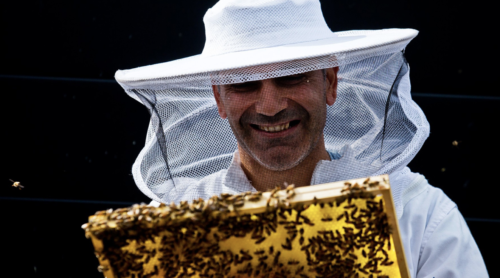
Agricultural consultant and beekeeper Aref Haboo checking beehives at the Danish Federation of Trade Unions.
All Photos from Bybi
In the face of rising anti-immigrant sentiment, an organization has worked to integrate new arrivals to Copenhagen by taking care of honeybees.
By Agostino Petroni, Yes Magazine, April 2, 2021
https://www.yesmagazine.org/social-justice/2021/04/02/denmark-refugees-honeybees
“It was wonderful before the war,” says Aref Haboo, a 48-year-old agricultural consultant describing Shie, the small village in the Afrin province of northern Syria he called home.
There, for 18 years, Haboo had taken care of 50 honeybee colonies spread among olive groves, orange cultivations, and vineyards.
“If I got sad or stressed, I would make some food and coffee and go lie in the shade near the bees to see how they fly, how they collect nectar, and I would listen to them,” Haboo says.
But in December 2013, as the Islamic State of Iraq and Syria (ISIS) started taking control of the country, he knew he had to leave.
ISIS militants blocked the road to Haboo’s village and threatened to kill him.
Haboo sold everything he owned and rented out his house to gather the $12,000 needed to flee the country.
He went first, leaving behind his wife and children in hopes of sparing them the treacherous journey ahead.
If he could make it to Europe, a reunification policy would then allow his family to join him.
Haboo crossed the Turkish border by foot, then hid in a delivery truck that smuggled him into Greece, and finally crossed the Mediterranean Sea to Italy on a boat.
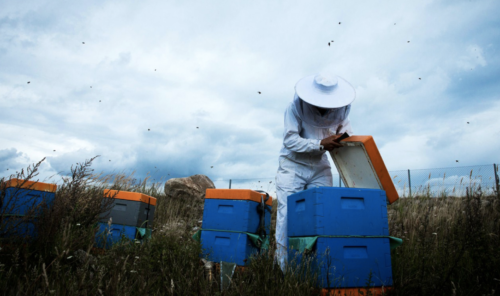
Aref Haboo checking beehives at Copenhagen Airport.
After 46 days of frightening travel, he arrived in Copenhagen, Denmark.
Haboo didn’t speak a word of Danish at the time, and, like most migrants, he needed a job to be able to face the difficulties of settling down in the new country.
Haboo attended a job-search colloquium put on by the Greve municipality, 12 miles from Copenhagen, which connected him to Bybi, a social enterprise and community organization of city beekeepers.
“We don’t work with Aref as a refugee,” says Oliver Maxwell, the founder and director of Bybi. “We work with him as somebody who’s passionate and interested about bees and can contribute something to our community.”
This inclusivity has been central to Maxwell’s approach since he launched Bybi in 2010.
Originally from Britain, the 43-year-old has been living in Denmark since 2007 and regularly holds honey-making courses to groups of migrants, people experiencing homelessness, or anyone in need of a fresh start.
He welcomes people from any background to work and volunteer with his organization.
According to Maxwell, Denmark is far away from being a wonderfully welcoming place that integrates refugees.
“Denmark is an incredibly racist society, and they’ve really done everything they can to make sure that these refugees don’t come,” Maxwell says. “So for us, [Bybi] is not about producing honey, but it’s about the health of the community in which bees, flowers, and people thrive.”
“And if you do that right,” he says, “then the honey comes out as almost magical.”
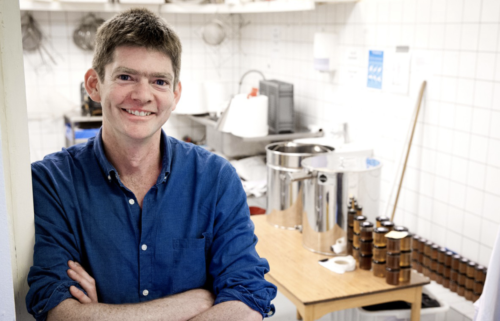
Oliver Maxwell, founder and director of Bybi, in the Bybi honey factory.
Bybi’s Beginnings
In December 2009, Maxwell was biking around an industrial area on the southeastern edge of Copenhagen when he saw some beehives.
Intrigued, he called the phone number on the hives and met with the Argentinian beekeeper who cared for them.
He sat down and chatted with the beekeeper about his work for a whole afternoon.
“It’s like pulling on a piece of string, and then it just kind of leads into a whole fantastic hidden universe of connections that you hadn’t seen before,” Maxwell says. “And that’s what the bees did.”
Maxwell wanted to do something about climate change and the problems of the society he was living in, so in 2010, he decided to found Bybi, which in Danish means “city bee.”
His plan was to become a beekeeper, a dying profession in the Copenhagen area.
He set up 30 hives and produced 2,000 pounds of honey in his first year.
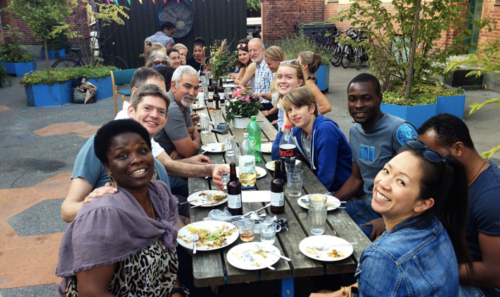
Bybi staff and volunteers at an end-of-season party in 2016.
Since then—and in the face of rising anti-immigrant sentiment in the European Union over the past decade—Bybi has worked to integrate new arrivals to Copenhagen by taking care of honeybees.
With some 150 colonies in 30 locations across Copenhagen, Bybi employs marginalized people to plant flowers in windowsills, place beehives on rooftops, and harvest and pack honey.
In so doing, the group is bringing the benefits of biodiversity to this urban area.
To further overcome social divides, Maxwell partners with nonprofits, businesses, and municipalities to try to involve as many people as possible in the world of beekeeping.
Pia Staalgaard, the sustainability coordinator from the Frederiksberg Municipality, has been working with Bybi since 2016, keeping beehives at one of the municipality’s social institutions for people with severe autism.
“It is so important to be able to recognize the value in people living on the edge of society who perhaps do not completely master the Danish language,” she says. “Their life has value too.”
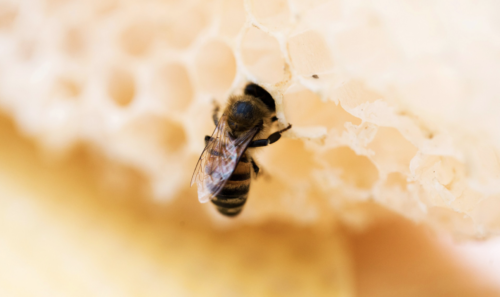
Close-up of a bee on wax.
The Ecology of Bees
An anthropologist by training, Maxwell spent his 20s working on nature reserves in Vietnam and for enterprises in the U.K.
He understood early on how people, bees, and flowers were connected.
There are about 20,000 bee species worldwide: some of them, like honeybees, make honey, but all of them act as pollinators, keeping entire ecosystems alive.
However, bee populations have declined dramatically in the past few decades because of climate change, widespread use of pesticides, and deforestation.
This imperils not only the bees’ survival but the ecosystems they support.
That’s one of the many reasons that city beekeeping projects like Bybi are blooming all around the world, from New York to London to Rome.
The shared goal is to bring pollinators back to otherwise polluted and environmentally declining urban spaces.
In urban areas, honeybees are safe from the pesticides used in agricultural fields.
And while the bees can actually find more flowers in the city, they are at risk from other factors like vandalism and diseases that spread among bee colonies.
Honeybees themselves can become an environmental problem too.
The honeybee, Apis mellifera, is a species native to Europe, the Middle East, and Africa.
It was brought to North America by settlers where it has created lots of problems for native species.
Honeybees are very efficient foragers and tend to colonize an area once they’re introduced.
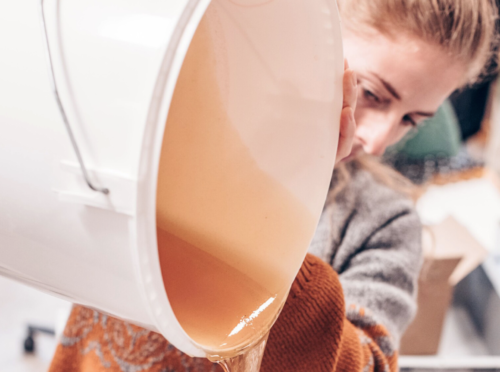
Bybi volunteer Nana Kramp pouring honey.
In the U.S., honeybees are raised commercially and their hives transported around the country on flatbed trucks to pollinate large-scale monocultures like almonds and rapeseed.
They have become a critical component of industrial agricultural production.
In addition to pollinating the crops, the bees also compete with native species for forage, becoming part of an extractive industry.
During winter months, while other insect populations naturally decline, honeybee colonies are helped by humans who provide supplemental food, giving them a significant competitive advantage over native species, whose populations are dropping steadily.
But back in Denmark, it’s a different story.
In 2017, Thomas Blindbæk, a Danish biologist, studied whether any conflict existed between honeybees and native species in Danish urban areas.
He found no adverse effects of the competition. “Instead, a significant positive correlation between the number of honeybees, and the number [of] wild bees was found overall,” Blindbæk wrote.
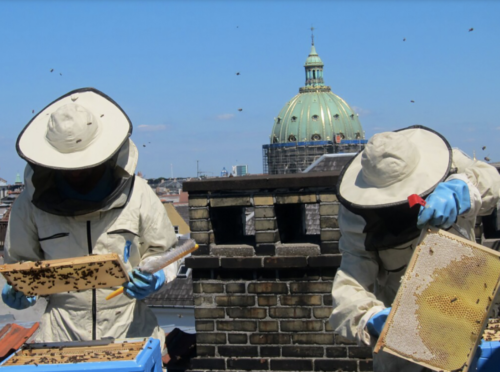
Bybi beekeepers checking beehives on the roof of the European Environment Agency headquarters in Copenhagen, Denmark.
A Greener, Healthier City
In Copenhagen, Bybi’s honey is the result of a community effort to make the city greener.
One of the crucial aspects of Bybi’s project is to plant flowers all around the city.
Volunteers pack and distribute tens of thousands of seeds to schools, and businesses create green areas where bees and other pollinators can thrive.
“We aim to make it intuitive for people to plant flowers for all pollinators when they eat honey,” Maxwell says. “Urban environments give us a huge opportunity to do this.”
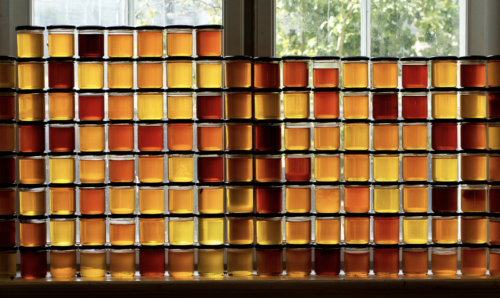
A map of Copenhagen in honey. Each jar of honey represents a beehive in Copenhagen and has a different flavor and color.
Velux, a company specializing in window production, planted large fields of flowers in front of the company’s headquarters in Hørsholm, a town 15 miles from Copenhagen, and hired Bybi to take care of eight honeybee colonies.
“It is a social project for the community but also the employees,” says Mette Ryby, the regional manager at Velux.
She says employees are ambassadors of the work that bees do for the environment, and the company involves its employees in the process by planting flowers or simply buying the local honey.
Now, dozens of other businesses around Copenhagen have Bybi’s beehives on their rooftops, including IKEA, L’Oréal, and Muji.
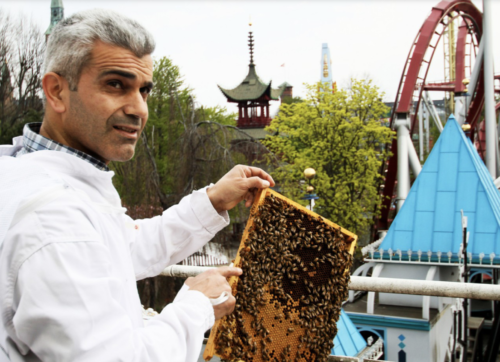
Aref Haboo checking beehives at Tivoli Gardens.
Today Haboo, the Syrian beekeeper, has been reunited with family.
His wife and kids arrived in Denmark in 2015 by plane thanks to the reunification program.
Haboo is now in charge of field operations for Bybi, routinely visiting all the millions of bees spread around Copenhagen to ensure they are healthy, happy, and have enough space.
“When I work here, I feel like I am part of the place,” Haboo says. “I never think I am going to work. I feel like it is my own bees, my own organization.”

